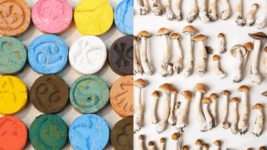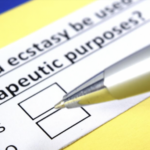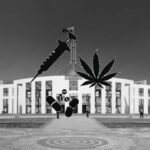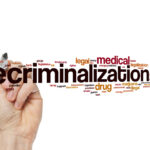Authorised Psychiatrists Will Soon Be Allowed to Prescribe MDMA and Psilocybin

The Therapeutic Goods Administration (TGA) announced on 3 February that two popular recreationally used illicit substances, MDMA and psilocybin, will be available to specifically authorised psychiatrists to prescribe to patients for certain mental health conditions.
Better known as party drug ecstasy, MDMA (3,4-methylenedioxy-methamphetamine) will be available for patients with treatment-resistant depression, while psilocybin, the psychoactive component of magic mushrooms, will be used to treat PTSD (post-traumatic stress disorder).
Psychedelics drugs, like these substances, have been used for millennia. And although their mental health benefits have been the focus of ongoing research for decades, the greenlighting of their use by practitioners has long been resisted due to the stigmatisation of these drugs under prohibition.
So, while lawful psychedelic-assisted psychotherapy does mark a legal and medical change in approach to these substances, drug law reformists assert that, while welcomed, this shift falls short of the current social use and understanding of these drugs that rank low on the harms caused chart.
Evidence-based treatment
“It’s a small step in the right direction, and it will undoubtably make the lives of people suffering from PTSD and depression better. But it should have happened a long time ago,” Unharm campaigns director Sam Kidd told Sydney Criminal Lawyers.
“This decision by the TGA, which is a non-political body, is an example of when you take the politics out of drug policy and base decisions on evidence.”
The TGA decision involves both psilocybin and MDMA being removed from schedule 9 of The Poisons Standards, where they’re currently classed as prohibited substances and placing them in schedule 8, which will see them considered controlled drugs, with limited permitted use.
In terms of access, medical MDMA and psilocybin will be available via authorised prescribers: those showing a level of qualification and expertise in relation to them. And due to the vulnerability of patients undergoing these treatments, their use will take place in controlled medical settings.
“We should use all the best tools at our disposable to help people manage their health and wellbeing,” Kidd added. “It doesn’t make sense that people grappling with PTSD, such as survivors of sexual violence or returned servicepeople, haven’t been able to access these lifesaving treatments.”
Legalise and regulate
The National Drug Strategy Household Survey 2019 report outlines that MDMA is the third most popular illicit substance used in the community, with 3 percent of the population having used it in the 12 months prior and 12.5 percent having used it during their lifetimes.
The report also suggests that the use of hallucinogens, like magic mushrooms, is on the rise, with 1.6 percent of the population having used them in the last 12 months, and 61 percent of those people having specifically used mushrooms over that timeframe.
“Hundreds of thousands of people from all walks of life use MDMA and psilocybin to have fun with their friends or to self-medicate,” Kidd made clear. “We believe that the best approach is to legalise and regulate them.”
“For most people who use MDMA and psilocybin, it’s a fairly small part of their lives,” the drug law reformist continued. “In fact, being criminalised for their use is the biggest risk that they face. And locking people up for having a good time is unjust and harmful.”
Indeed, with cannabis legalisation fast becoming the norm globally, the Greens and Legalise Cannabis are pushing for the plant to be sold in a regulated manner in this country, whilst MDMA and magic mushrooms are considered likely second place contenders to undergo this process.
State parliament dinosaurs
The Labor-Greens government in the ACT passed laws last October that will see the most popular illicit substances decriminalised in the capital later this year, which will involve a system where those found in possession of a personal amount of a drug sent to treatment or issued with a fine.
Last November’s Victorian election saw that constituency reflect this trend towards drug reform with its electing of a number of minor party and independent candidates who favour such changes. However, there’s no indication the major parties in that state have seriously considered such laws.
And while it’s likely Labor will take out the NSW election in March, Unharm posits that this is unlikely to transpire into significant drug law reform in this state, as, at present, the only party in parliament with a progressive stance is the NSW Greens, which has decriminalisation on its policy platform.
“Unfortunately, the dynamics in NSW are quite similar to Victoria, where we have two major parties who are very sensitive to being seen as soft on crime,” Kidd continued. “In NSW, as in Victoria, the institution of the police and the conservative media are incredibly politically powerful.”
“And we all know that The Daily Telegraph loves to fearmonger about drugs in order to sell more papers.”
Unharm has consulted with both major parties in the leadup to the NSW election and found that neither has the political courage to act upon the evidence, the advice of experts or the want of the community, which is increasingly calling for legalised cannabis and drug decriminalisation.
“So, in terms of the NSW election,” Kidd said in conclusion, “it’s great to see the Greens standing up for decriminalisation of all drugs, but it will be some time before NSW major party politicians are willing to get with the times and end the unjust criminalisation of people who use drugs.”







